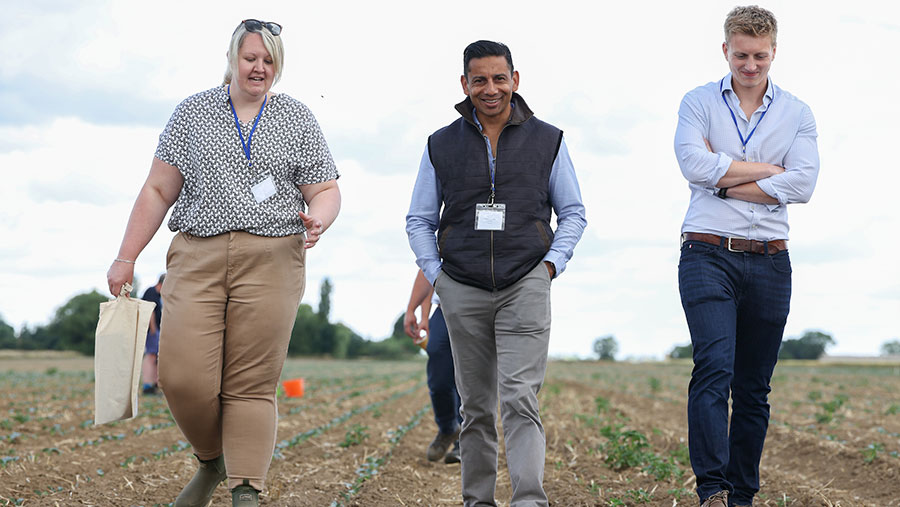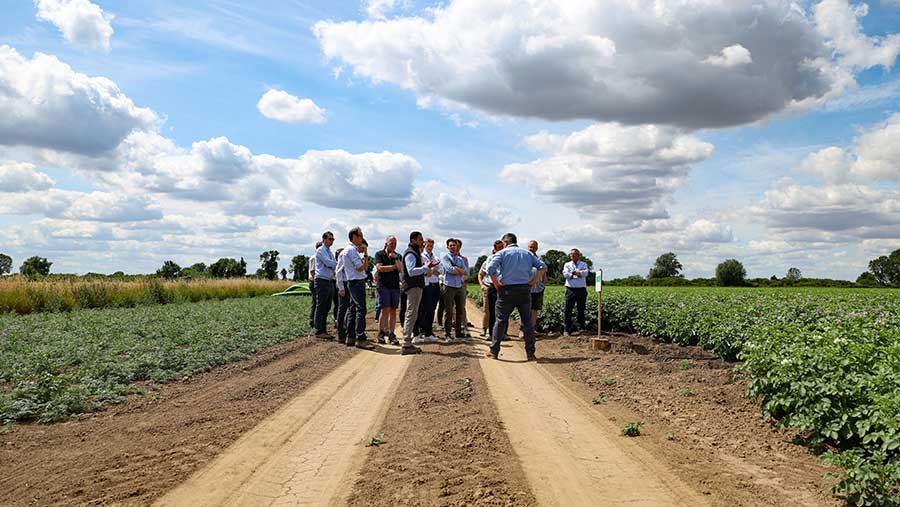Advertiser content
Tesco’s low carbon concept farms get underway
Farms will trial new technologies and processes, reduce risk and share insights and learnings to drive sustainability across the wider industry.
A partnership approach to help the farming industry become more sustainable is central to both of Tesco’s recently launched low carbon concept farms, one of which is based in Lincolnshire and is focusing on arable crop production.
Working across the farm’s seven-year rotation, Tesco will work with four of its key suppliers to test and trial potential solutions for reducing emissions in the crops being grown: potatoes, peas, wheat and broccoli.
Some of the crops will be available on the retailers’ shelves later in the year, while the insights from the trials will be shared with Tesco’s broader supply chain.

© Tesco
The aim is to take a whole farm approach, identifying the best farm rotations for minimising total emissions, while also looking at how they improve the outcomes for nature and soil health to provide actionable insights that can be mirrored on farms of all types
Innovative processes and new technology are being trialled on the farm, with the retailer taking on some of the risk associated with practice changes, which would otherwise land solely on farmers
Ashwin Prasad, UK CEO of Tesco, explains that a fundamental part of the work is to ensure that farming businesses can achieve both economic and environmental sustainability.
“Innovation comes with costs attached,” he says. “Making farm investment decisions is difficult in the current economic climate, so our focus is on developments that both drive efficiencies and make the business more environmentally-friendly.”
While de-risking decisions is one ambition of the low carbon concept farm, the other is to highlight proven and practical applications that could be scaled successfully, he adds.
“Our Greenprint for UK Farming report told us that over 70% of farmers want to make these changes but financial and political uncertainty is holding them back from implementing measures that future-proof their businesses.”
A forum that showcases best practice in a realistic setting and shares learnings will accelerate progress, he believes.
“The commercial farm setting is key; other producers will be able to see which innovations are working and what differences they are making.”
The project aims to develop approaches for reducing emissions across a range of crops to help identify the most effective changes in a commercial setting.

© Tesco
In potatoes, Branston is looking at low input varieties, low carbon fertilisers and soil microbiology, as well as the potential role of advanced rock weathering and early disease detection.
Mark Willcox, Branston’s agronomy director, points out that the progress already made with reducing the 85kg CO₂e per tonne in growing and storing potatoes has come from changing cultivations, using alternative fuels and switching fertiliser type.
“While that work continues, we can now move to the next stage and validate other techniques.”
Broccoli supplier T H Clements will be evaluating peat-free composts, the use of strip tillage to establish the crop, early disease detection using drones and alternative fuels.
Agronomist Adrian Drury reveals an anaerobic digester waste from the farm, mixed with coir and tree bark, has proved to be a good composting material, while strip tillage has given a 60% fuel saving.
“We are also testing auto planting, camera-guided inter-row cultivators and the use of drones for crop scouting, to see if they bring efficiencies. Robotic harvesting will be introduced this year – these are exciting times.”
In wheat, miller Heygates is keen to encourage innovation that supports grain quality and reduces the farming industry’s exposure to risk.
“We’re already seeing cover crops, reduced tillage techniques and alternative fuels being used in the field with positive results,” says Mervin Poole.
“We want to add to these and evaluate the place for more resistant varieties, better grain drying and the use of photocatalyst technology, such as R-Leaf, in a whole crop system.”
The priorities for vining peas are to produce a greenhouse gas emissions calculator for the crop.
Stuart Ashton of Greenyard states that, “in addition, our focus will be on techniques for optimising plant populations, drill innovations, the use of low impact tyres, minimum tillage and existing tramlines to prevent soil compaction, as well as alternative fuels and improved field selection.”
Tesco has also launched another low carbon concept farm in partnership with livestock producer APB and hopes that insights gained from these two farms will help drive sustainability throughout the supply chain.
Provided by
Tesco plc is a British multinational groceries and general merchandise retailer headquartered in the United Kingdom at its head offices in Welwyn Garden City, England. The company was founded by Jack Cohen in Hackney, London, in 1919.
